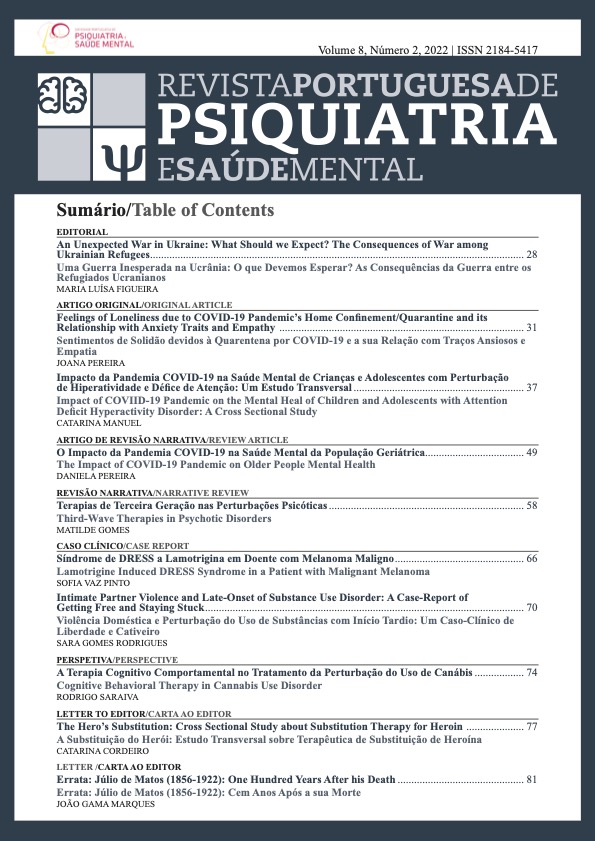Terapias de Terceira Geração nas Perturbações Psicóticas
DOI:
https://doi.org/10.51338/rppsm.319Palavras-chave:
Empatia, Perturbações Psicóticas/tratamento, Mindfulness, Terapia Cognitivo‑ComportamentalResumo
As perturbações psicóticas são síndromes clínicas que se caracterizam pela dificuldade em distinguir a experiência interna
da realidade externa, com emergência de delírios, alucinações e/ou desorganização psicomotora, experiências frequentemente
angustiantes para o doente. Embora sejam patologias de evolução heterogénea, a maioria dos doentes experimenta
dificuldades na reabilitação psicossocial, com perda de autoestima e de qualidade de vida.
As terapias cognitivo‑comportamentais
de terceira geração, desenvolvidas nos últimos trinta anos, têm sido amplamente
estudadas, com evidência científica a comprovar a sua eficácia no tratamento de várias patologias, como depressão, ansiedade
e dor crónica. Embora o interesse na aplicação destas terapias nas perturbações psicóticas se tenha desenvolvido
mais recentemente, há já vários estudos que demonstram a sua utilidade na redução dos sintomas psicóticos e na melhoria
do bem‑estar
dos doentes com psicose. Esta revisão foca‑se
nos contributos das terapias baseadas em mindfulness, terapia
de aceitação e compromisso e terapia focada na compaixão no tratamento de perturbações psicóticas.
Downloads
Referências
Langer, Á. I. et al. The effect of a mindfulness-based intervention in cognitive functions and psychological well-being applied as an early intervention in schizophrenia and high-risk mental state in a Chilean sample: study protocol for a randomized controlled trial. Trials 18, 233 (2017).
Böge, K., Thomas, N. & Jacobsen, P. Is mindfulness for psychosis harmful? Deconstructing a myth. The British Journal of Psychiatry 218, 71–72 (2021).
Dyga, K. & Stupak, R. Meditation and psychosis. A trigger or a cure? Archives of Psychiatry and Psychotherapy 17, 48–58 (2015).
Walsh, R. & Roche, L. Precipitation of acute psychotic episodes by intensive meditation in individuals with a history of schizophrenia. American Journal of Psychiatry 136, 1085–1086 (1979).
Chadwick, P. Mindfulness for psychosis: a humanising therapeutic process. Current Opinion in Psychology 28, 317–320 (2019).
Lucena-Santos, P., Pinto-Gouveia, J. & Oliveira, M. Terapias Comportamentais de Terceira Geração. (2015).
Hayes, S. C. Acceptance and commitment therapy, relational frame theory, and the third wave of behavioral and cognitive therapies. Behavior Therapy 35, 639–665 (2004).
Pérez-Álvarez, M. Third-Generation Therapies: Achievements and challenges. Int J Clin Health Psychol 12, 291–310 (2012).
Herbert, J. D. & Forman, E. M. Acceptance and Mindfulness in Cognitive Behavior Therapy: Understanding and Applying the New Therapies. (2011).
Hayes, S. C., Strosahl, K. D. & Wilson, K. G. Acceptance and commitment therapy: An experiential approach to behavior change. (1999).
Linehan, M. M. Cognitive-behavioral treatment of borderline personality disorder. (1993).
Kohlenberg, R. J. & Tsai, M. Functional analytic psychotherapy. (1991).
Jacobson, N. S. & Christensen, A. Integrative couple therapy: Promoting acceptance and change. (1996).
Segal, Z. v., Williams, J. M. G. & Teasdale, J. D. Mindfulness-based cognitive therapy for depression: A new approach to preventing relapse. (2002).
Gilbert, P. Introducing compassion-focused therapy. Advances in Psychiatric Treatment 15, 199–208 (2009).
Cullen, C. Acceptance and Commitment Therapy (ACT): A Third Wave Behaviour Therapy. Behavioural and Cognitive Psychotherapy 36, 667–673 (2008).
Hayes, S. C., Villatte, M., Levin, M. & Hildebrandt, M. Open, Aware, and Active: Contextual Approaches as an Emerging Trend in the Behavioral and Cognitive Therapies. Annual Review of Clinical Psychology 7, 141–168 (2011).
Kabat-Zinn, J. Mindfulness-based interventions in context: Past, present, and future. Clinical Psychology: Science and Practice 10, 144–156 (2003).
Associação Portuguesa para o Mindfulness. O que é o mindfulness. http://apmindfulness.com/mindfulness.html (2021).
Böge, K. et al. Mindfulness-Based Interventions for In-Patients With Schizophrenia Spectrum Disorders—A Qualitative Approach. Frontiers in Psychiatry 11, (2020).
Goldberg, S. B. et al. Mindfulness-based interventions for psychiatric disorders: A systematic review and meta-analysis. Clinical Psychology Review 59, 52–60 (2018).
Zhang, D., Lee, E. K. P., Mak, E. C. W., Ho, C. Y. & Wong, S. Y. S. Mindfulness-based interventions: an overall review. British Medical Bulletin 138, 41–57 (2021).
Grossman, P., Niemann, L., Schmidt, S. & Walach, H. Mindfulness-based stress reduction and health benefits. Journal of Psychosomatic Research 57, 35–43 (2004).
Pepper, S. C. World hypotheses: A study in evidence. (1942).
Hayes, S. C. & Gifford, E. v. The Trouble with Language: Experiential Avoidance, Rules, and the Nature of Verbal Events. Psychological Science 8, 170–173 (1997).
Martins, M. et al. Mindfulness e Compaixão na recuperação da psicose. (Pactor, 2020).
Gilbert, P. Compassion: Conceptualisations, research and use in psychotherapy. (Routledge, 2005).
Owen, M. J., Sawa, A. & Mortensen, P. B. Schizophrenia. The Lancet 388, 86–97 (2016).
Lieberman, J. A. & First, M. B. Psychotic Disorders. New England Journal of Medicine 379, 270–280 (2018).
American Psychiatric Association. DSM-5. Manual de diagnóstico e estatística das perturbações mentais. (Climepsi Editores, 2014).
Millier, A. et al. Humanistic burden in schizophrenia: A literature review. Journal of Psychiatric Research 54, 85–93 (2014).
Gouveia, M. et al. The cost and burden of schizophrenia in Portugal in 2015. International Journal of Clinical Neurosciences and Mental Health S13 (2018) doi:10.21035/ijcnmh.2017.4(Suppl.3).S13.
Gonçalves-Pinho, M., Ribeiro, J. P. & Freitas, A. Schizophrenia Related Hospitalizations – a Big Data Analysis of a National Hospitalization Database. Psychiatric Quarterly 92, 239–248 (2021).
Kuipers, E., Yesufu-Udechuku, A., Taylor, C. & Kendall, T. Management of psychosis and schizophrenia in adults: summary of updated NICE guidance. BMJ 348, g1173–g1173 (2014).
Haddad, P. M. & Correll, C. U. The acute efficacy of antipsychotics in schizophrenia: a review of recent meta-analyses. Therapeutic Advances in Psychopharmacology 8, 303–318 (2018).
Dimidjian, S. et al. Considering Meta-Analysis, Meaning, and Metaphor: A Systematic Review and Critical Examination of “Third Wave” Cognitive and Behavioral Therapies. Behavior Therapy 47, 886–905 (2016).
Bach, P. & Hayes, S. C. The use of acceptance and commitment therapy to prevent the rehospitalization of psychotic patients: A randomized controlled trial. Journal of Consulting and Clinical Psychology 70, 1129–1139 (2002).
Wang, L.-Q., Chien, W. T., Yip, L. K. & Karatzias, T. A randomized controlled trial of a mindfulness-based intervention program for people with schizophrenia: 6-month follow-up. Neuropsychiatric Disease and Treatment Volume 12, 3097–3110 (2016).
Chien, W. T., Bressington, D., Yip, A. & Karatzias, T. An international multi-site, randomized controlled trial of a mindfulness-based psychoeducation group programme for people with schizophrenia. Psychological Medicine 47, 2081–2096 (2017).
Chien, W. T. & Lee, I. Y. M. The Mindfulness-Based Psychoeducation Program for Chinese Patients With Schizophrenia. Psychiatric Services 64, 376–379 (2013).
Tabak, N. T. & Granholm, E. Mindful cognitive enhancement training for psychosis: A pilot study. Schizophrenia Research 157, 312–313 (2014).
Davis, L. & Kurzban, S. Mindfulness-Based Treatment for People With Severe Mental Illness: A Literature Review. American Journal of Psychiatric Rehabilitation 15, 202–232 (2012).
Khoury, B., Lecomte, T., Gaudiano, B. A. & Paquin, K. Mindfulness interventions for psychosis: A meta-analysis. Schizophrenia Research 150, 176–184 (2013).
Louise, S., Fitzpatrick, M., Strauss, C., Rossell, S. L. & Thomas, N. Mindfulness- and acceptance-based interventions for psychosis: Our current understanding and a meta-analysis. Schizophrenia Research 192, 57–63 (2018).
Cramer, H., Lauche, R., Haller, H., Langhorst, J. & Dobos, G. Mindfulness- and Acceptance-based Interventions for Psychosis: A Systematic Review and Meta-analysis. Global Advances in Health and Medicine 5, 30–43 (2016).
Jansen, J. E., Gleeson, J., Bendall, S., Rice, S. & Alvarez-Jimenez, M. Acceptance- and mindfulness-based interventions for persons with psychosis: A systematic review and meta-analysis. Schizophrenia Research 215, 25–37 (2020).
Liu, Y., Li, I. & Hsiao, F. Effectiveness of mindfulness‐based intervention on psychotic symptoms for patients with schizophrenia: A meta‐analysis of randomized controlled trials. Journal of Advanced Nursing 77, 2565–2580 (2021).
Li, Y. et al. Feasibility, acceptability, and preliminary effectiveness of mindfulness‐based interventions for people with recent‐onset psychosis: A systematic review. Early Intervention in Psychiatry 15, 3–15 (2021).
Samson, C. & Mallindine, C. The feasibility and effectiveness of running mindfulness groups in an early intervention in psychosis service. The Cognitive Behaviour Therapist 7, e9 (2014).
Khoury, B., Lecomte, T., Comtois, G. & Nicole, L. Third-wave strategies for emotion regulation in early psychosis: a pilot study. Early Intervention in Psychiatry 9, 76–83 (2015).
Tong, A. C. Y. et al. A Low-Intensity Mindfulness-Based Intervention for Mood Symptoms in People with Early Psychosis: Development and Pilot Evaluation. Clinical Psychology & Psychotherapy 23, 550–560 (2016).
Chadwick, P. Relationship to Internal Experience: Mindfulness Practice. in Person-Based Cognitive Therapy for Distressing Psychosis 58–97 (John Wiley & Sons Ltd, 2008). doi:10.1002/9780470713075.ch5.
Chadwick, P., Taylor, K. N. & Abba, N. Mindfulness Groups for People with Psychosis. Behavioural and Cognitive Psychotherapy 33, 351–359 (2005).
Shonin, E., van Gordon, W. & Griffiths, M. D. Do mindfulness-based therapies have a role in the treatment of psychosis? Australian & New Zealand Journal of Psychiatry 48, 124–127 (2014).








